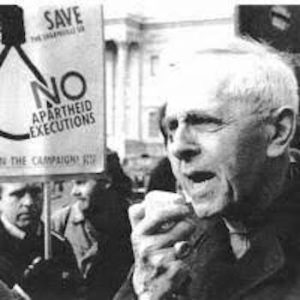
Trevor Huddleston
*Trevor Huddleston was born on this date in 1913. He was a white English Anglican bishop and racial justice activist. He was best known for his anti-apartheid.
Ernest Urban Trevor Huddleston was the son of Ernest Huddleston and was born in Bedford, Bedfordshire, and educated at Lancing College, Christ Church, Oxford, and Wells Theological College. He joined an Anglican religious order, the Community of the Resurrection (CR), in 1939, taking vows in 1941, having already served for three years as a curate at St Mark's Swindon. He had been made a deacon at Michaelmas 1936 and ordained a priest the following Michaelmas.
In September 1940, Huddleston sailed to Cape Town, and in 1943 he went to the Community of the Resurrection mission station at Rosettenville (Johannesburg, South Africa). He was sent there to build on the work of Raymond Raynes, whose monumental efforts, building three churches, seven schools, and three nursery schools catering to over 6,000 children, had proved so racially demanding that the community summoned him back to Mirfield to recuperate. Raynes was deeply concerned about who should be appointed to succeed him. He met Huddleston, who had been appointed to nurse him while he was in the infirmary. As a result of that meeting, much to Huddleston's surprise, as he had only been a member of the community for four years, Raynes was convinced that he had found his successor.
For the next 13 years in Sophiatown, Huddleston became a much-loved priest and respected anti-apartheid activist, earning him the nickname Makhalipile ("dauntless one"). He fought against the apartheid laws, which were increasingly systematized by the Nationalist government and voted in by the white electorate in 1948. In 1955, the African National Congress (ANC) bestowed the rare Isitwalandwe award of honor on him at the Freedom Congress in Kliptown. He was particularly concerned about the Nationalist Government's decision to bulldoze Sophiatown and forcibly remove all its inhabitants sixteen miles further away from Johannesburg.
Despite Huddleston's efforts, these removals began on February 9, 1955, when Nelson Mandela described Huddleston as one of the leaders of the opposition to the removal. Among other work, he established the African Children's Feeding Scheme (which still exists today). He raised money for the Orlando Swimming Pools, the only place black children could swim in Johannesburg until post-1994. There are many South Africans whose lives were changed by Huddleston; one was Hugh Masekela, for whom Huddleston provided his first trumpet as a 14-year-old pupil at St. Martin's School (Rosettenville) in South Africa.
Soon after, the ‘Huddleston Jazz Band’ was formed, sparking a career of untold proportions across the globe for Masekela and his fellow South African, Jonas Gwangwa. Other notable persons who credit Huddleston with influencing their lives include Emeritus Archbishop Desmond Tutu, Sally Motlana, (activist and vice-chair of the South African Council of Churches during the 1970s), Emeritus Archbishop Khotso Makhulu. Huddleston was close to O R Tambo, ANC President, during the years of exile, from 1962 to 1990. They hosted many conferences, protests, and actions together in the face of fierce opposition from Margaret Thatcher, the South African government, and their allies.
Trevor Huddleston died in Mirfield, West Yorkshire, England, on April 20, 1998. A window in memory of him is in Lancing College chapel. The Trevor Huddleston Memorial Centre in Sophiatown was established in 1999, where he had been active and then supervised mission activity for 13 years. The Centre delivers youth development programs in Johannesburg and heritage and cultural projects promoting Huddleston's belief in developing the potential of every young person and his commitment to non-racialism, multi-faith issues, and social justice.
Hosted by the Trevor Huddleston Memorial Centre (based in Sophiatown, Johannesburg), the Gala Evening raised funds for the work of the Memorial Centre to help young entrepreneurs get a foothold in the creative industries in South Africa. The Memorial Centre runs training and incubation for entrepreneurs. It annually awards the Fr Huddleston Arts Bursary to one young South African, giving them experience in a UK community art setting for 3–6 months. In this way, the legacy of Huddleston in assisting young people is continued.